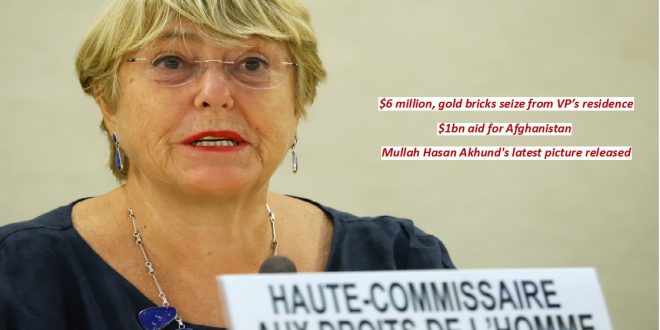14-09-2021
By SJA Jafri + Bureau Report + Agencies
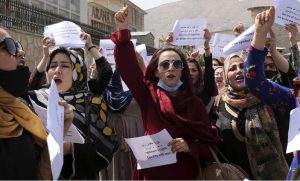 GENEVA/ KABUL/ ISLAMABAD: The Taliban are breaking their promises on women’s rights and inclusivity in Afghanistan, the UN rights chief said on Monday, as she also criticised violence against protesters and alleged reprisal killings.
GENEVA/ KABUL/ ISLAMABAD: The Taliban are breaking their promises on women’s rights and inclusivity in Afghanistan, the UN rights chief said on Monday, as she also criticised violence against protesters and alleged reprisal killings.
Michelle Bachelet said there were “credible allegations” former members of the security forces had been killed, and some people who worked for previous administrations had been detained and later “found dead”.
She also highlighted allegations of house-to-house searches of former officials, raids on civil society groups and “increasing violence against protesters and journalists”.
She told the UN Human Rights Council in Geneva she was “dismayed by the lack of inclusivity of the so-called caretaker cabinet, which includes no women and few non-Pashtuns”.
The announcement of the government of male loyalists last week was a key step in the Taliban’s consolidation of power over Afghanistan, following a military victory that saw them oust the US-backed administration on August 15.
Infamous for their strict rule from 1996 to 2001, the Taliban had promised a more inclusive government this time.
However, all the top positions were handed to key leaders from the movement and the Haqqani network, the most violent faction of the Taliban known for devastating attacks.
In an update to the council on the rights situation, requested during a special session last month, Bachelet stressed that most Afghans were eager to see an end to decades of conflict and division.
“They long for peace and stability in a country where they and their children can prosper,” she said.
And she highlighted promises by the Taliban to install a more moderate brand of rule including protecting women’s rights.
“In contradiction to assurances that the Taliban would uphold women’s rights, over the past three weeks women have instead been progressively excluded from the public sphere,” she said.
Bachelet reiterated her appeal to the council to set up a “dedicated mechanism” to monitor the rights situation in Afghanistan in a bid to ensure accountability for violations.
Rights groups and some countries have also voiced hope that the current council session, which lasts until October 8, will go further than the special session last month, which stopped short of ordering an international investigation into abuses in the country.
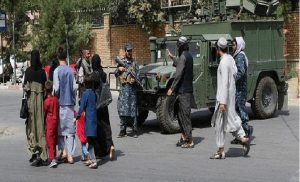 Speaking before the council on Monday, German Foreign Minister Heiko Maas for instance said his country supported “a strong mandate” for the body to monitor the rights situation in Afghanistan.
Speaking before the council on Monday, German Foreign Minister Heiko Maas for instance said his country supported “a strong mandate” for the body to monitor the rights situation in Afghanistan.
“We demand from the Taliban that they respect basic human rights, particularly the rights of women and minorities,” he said, adding that it would be a “benchmark” for future engagement and aid.
In a now-viral video, the Taliban have claimed that they have seized up to six million dollars and about 15 bricks of gold from the residence of former Afghan vice-president Amrullah Saleh, reported The Khaama Press News Agency on Monday.
However, no comments have been received from Amrullah Saleh in this regard.
Taliban take control of Panjshir
Earlier, the Taliban swept to power last month and they said they had captured the Panjshir valley, the last holdout province, though the resistance has not conceded defeat.
The capture of Panjshir was a significant achievement for the Taliban, who had never been able to hold the valley.
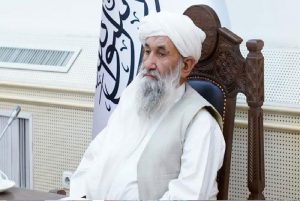 The group posted photos of its fighters standing in front of the provincial governor’s compound; much of the province is composed of smaller, remote mountain valleys that provide areas for opposition forces to regroup.
The group posted photos of its fighters standing in front of the provincial governor’s compound; much of the province is composed of smaller, remote mountain valleys that provide areas for opposition forces to regroup.
Amrullah Saleh still in Afghanistan
Last week, the ousted Afghan government’s ambassador to Tajikistan had said Panjshiri leader Ahmad Shah Massoud and Amrullah Saleh had not fled Afghanistan and their resistance forces are still fighting the Taliban.
Zahir Aghbar, envoy to Dushanbe under the government of ousted Afghan President Ashraf Ghani, told a news conference in Tajikistan’s capital that he was in regular contact with Saleh and that the resistance leaders were out of general communication for security reasons.
“I am in constant contact with Amrullah Saleh, who is currently in Panjshir and running the Islamic Republic of Afghanistan’s government,” he had said.
Meanwhile, the Taliban released Afghanistan’s interim Prime Minister Mullah Hasan Akhund’s latest picture on Monday.
The picture was shared by Mohammad Naeem, the Taliban’s spokesperson at the Doha office. In the picture, Akhund can be seen sitting on a chair.
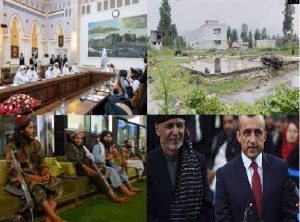 Till now, masses only had access to old pictures of the Afghan interim prime minister, who looks younger in them with black hair and a black bear. Compared to his previous pictures, the latest one shows him as an old man with a long white beard and white hair.
Till now, masses only had access to old pictures of the Afghan interim prime minister, who looks younger in them with black hair and a black bear. Compared to his previous pictures, the latest one shows him as an old man with a long white beard and white hair.
As Afghanistan’s foreign minister in 1999, Akhund had visited Pakistan where he had met then-prime minister Nawaz Sharif. A picture of the two heartily shaking hands can be seen below.
Other key members of the new Afghan government, who were sworn in on September 11, 2021, are:
Taliban co-founder, Mullah Abdul Ghani Baradar – acting deputy prime minister
Taliban negotiator in Doha, Amir Khan Muttaqi – acting foreign minister
Abas Stanikzai – acting deputy foreign minister
Son of Taliban founder and late supreme leader Mullah Omar, Mullah Yaqoob – acting defense minister
Leader of the feared Haqqani network, Sirajuddin Haqqani – acting interior minister
The Taliban spokesman had earlier clarified that these persons were part of an “acting” government.
 “Thankyou, firstly, as you said, the government we announced is an acting government; it is not the future and permanent government. Some of the ministers have not been declared yet, which will be soon,” Zabiullah Mujahid had said in a press conference last week.
“Thankyou, firstly, as you said, the government we announced is an acting government; it is not the future and permanent government. Some of the ministers have not been declared yet, which will be soon,” Zabiullah Mujahid had said in a press conference last week.
“The declaration of government is not final. These are acting ministers. I do not say they do not deserve, but at this stage, we are at an emergency state,” he had added.
Furthermore, donors have pledged more than a billion dollars to help Afghanistan, where poverty and hunger have spiraled since the Taliban took power, and foreign aid has dried up, raising the specter of a mass exodus.
UN Secretary-General Antonio Guterres said it was impossible to say how much of the money had been promised in response to an emergency UN appeal for $606 million to meet the most pressing needs of a country in crisis.
“It is impossible to provide humanitarian assistance inside Afghanistan without engaging with the de facto authorities,” Guterres told journalists on the sidelines of a donor conference in Geneva, adding it was “very important to engage with the Taliban at the present moment”.
James Bay reported from Geneva said that while UN chief was “very pleased” with the response of the international community, he said the prospect of an economic collapse was a “serious possibility”.
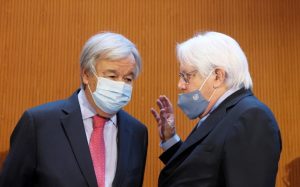 “The financial systems at the moment are extremely limited. Which means that a number of basic economic functions cannot be delivered,” he said responding to a question from Al Jazeera at a press conference.
“The financial systems at the moment are extremely limited. Which means that a number of basic economic functions cannot be delivered,” he said responding to a question from Al Jazeera at a press conference.
After decades of war, suffering and insecurity, Afghans are facing “perhaps their most perilous hour”, Guterres said earlier on Monday in his opening remarks to the donor conference, adding that “the people of Afghanistan need a lifeline.
“Let us be clear: This conference is not simply about what we will give to the people of Afghanistan. It is about what we owe.”
He said food supplies could run out by the end of the month.
The Taliban previously ruled Afghanistan between 1996-2001, barring women from work and teenage girls from school, and were toppled in an invasion led by the United States, which accused them of sheltering al-Qaeda members behind the September 11 attacks.
The Taliban swept back to power last month in a lightning advance as the last US-led NATO troops pulled out and the forces of the Western-backed government melted away.
With aid flows abruptly ending, German Foreign Minister Heiko Maas said international donors had a “moral obligation” to continue helping Afghans after their 20-year engagement.
Neighbours China and Pakistan have already offered help.
 Beijing announced last week that it would send $31m worth of food and health supplies to Afghanistan. Pakistan sent supplies such as cooking oil and medicine to authorities in Kabul, and called for the unfreezing of Afghanistan’s assets.
Beijing announced last week that it would send $31m worth of food and health supplies to Afghanistan. Pakistan sent supplies such as cooking oil and medicine to authorities in Kabul, and called for the unfreezing of Afghanistan’s assets.
“Past mistakes must not be repeated. The Afghan people must not be abandoned,” said Pakistan Foreign Minister Shah Mehmood Qureshi, whose country would most likely bear the brunt of any exodus of refugees.
“Sustained engagement with Afghanistan in meeting its humanitarian needs is essential.”
Diplomatic Editor James Bays, reporting from Geneva, said some countries were “reluctant” to give money at this stage.
“They don’t want the money going into the hands of the Taliban,” he added.
Speaking to Al Jazeera in Geneva, UN humanitarian coordinator Martin Griffiths said the agency wanted to make sure the money went directly to those humanitarians on the ground who is delivering services to the Afghan people, calling the situation “very dire”.
US pledges $64m
The US ambassador to the United Nations, Linda Thomas-Greenfield, told the conference Washington was providing nearly $64 million in new humanitarian assistance for Afghanistan.
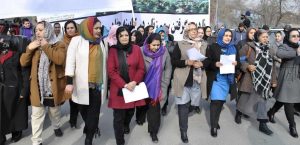 “Let us commit today to meeting this urgent appeal for financial support, commit to standing by humanitarian workers as they do their all-important work, and to stepping up humanitarian action in Afghanistan so we can save the lives of Afghans in need,” she said.
“Let us commit today to meeting this urgent appeal for financial support, commit to standing by humanitarian workers as they do their all-important work, and to stepping up humanitarian action in Afghanistan so we can save the lives of Afghans in need,” she said.
Even before the Taliban’s seizure of Kabul last month, half the population – or 18 million people – were dependent on aid. That figure looks set to increase due to drought and shortages of cash and food, UN officials and aid groups have warned.
About a third of the $606m being sought would be used by the UN World Food Program, which found that 93 percent of the 1,600 Afghans it surveyed in August and September were not consuming sufficient food, mostly because they could not get access to cash to pay for it.
“It’s now a race against time and the snow to deliver life-saving assistance to the Afghan people who need it most,” said WFP Deputy Regional Director Anthea Webb.
“We are quite literally begging and borrowing to avoid food stocks running out.”
The World Health Organization, another UN agency that is part of the appeal, is seeking to shore up hundreds of health facilities at risk of closure after donors backed out.
Charles Stratford, reporting from Kabul, said the situation at health clinics in the country was “completely shocking”.
“We visited a few days ago a rural clinic just outside of Kabul that had a number of women who were expecting to given birth any day. They didn’t even have rubber gloves. There were no antibiotics, no antiseptics,” he said.
“There were people coming in with colds and sore throats and the nurses and doctors could not even give them simple painkillers.”
 Pressmediaofindia
Pressmediaofindia
